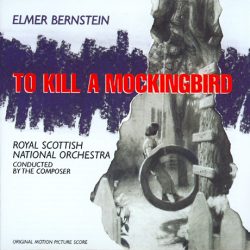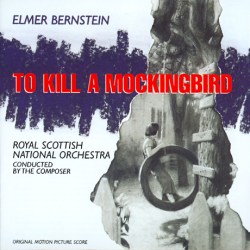Archive
TO KILL A MOCKINGBIRD – Elmer Bernstein
 100 GREATEST SCORES OF ALL TIME
100 GREATEST SCORES OF ALL TIME
Original Review by Craig Lysy
Universal Studio executives saw the universal critical acclaim afforded Harper Lee’s Pulitzer Prize winning novel To Kill A Mockingbird, and purchased the film rights, determined to bring her poignant story to the big screen. The project however stalled creatively and did not gain momentum until a generous budget was allocated and producer Alan J. Pakula took the reigns. He was inspired by the project, hired Horton Foote to write the screenplay, and tasked Robert Mulligan to direct. They brought in Gregory Peck to play the leading role of Atticus Finch, and Robert Duvall secured his debut role as Boo Radley. For Atticus’ children, newcomers Mary Badham was chosen to play Scout, and Phillip Alford to play Jem. Rounding out the cast were Brock Peters as Tom Robinson, James Anderson as Bob Ewell, Cillin Wilcox as Mayella Ewell, and John Megna as Dill Harris. Read more…
TO KILL A MOCKINGBIRD – Elmer Bernstein
Original Review by Craig Lysy
To Kill A Mockingbird is renowned as a celebrated Pulitzer prize winning novel written by American novelist Harper Lee. It was adapted for the screen by Horton Foote and is set in 1930’s Alabama during the era of the great depression. There are two distinct narratives operating in the tale. The first tells the story of a widowed and respected lawyer Atticus Finch, played in exemplary fashion by Gregory Peck, and his laudable but ultimately futile effort to defend a black man wrongly accused of raping a white woman. The equally important second narrative however is more intimate and focuses on Finch’s two young children, Scout and Jem. In many ways it is a coming of age tale as we see through their young eyes the struggle of growing up in the old south during a time where the races were segregated and black people were denied equality and justice under law. Made in 1962 before the civil rights act, the film provided an uncomfortable and potent commentary on the ugly cultural pathology that was still manifest in America many years after the Great Emancipation. Read more…


